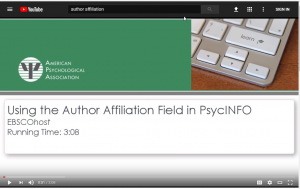In January of 2017, we posted about searching APA PsycInfo® by different vocabularies – keywords, index terms, classification codes, and MeSH.
In case you missed it, start the new semester off with a better understanding of which vocabulary will suit your needs.
Keywords (also called Key Concepts or Identifiers) – individual words, key concepts, or brief phrases that describe the document’s content; usually provided by the author or publisher.
Good for researchers who are new to a topic.
Index Terms (also called Subjects or Subject Headings) – are chosen by APA staff from Thesaurus of Psychological Index Terms®.
Good for the focused researcher.
Classification Codes (also called APA PsycInfo Classifications) – a descriptive term plus a corresponding numerical code; like the index terms, there is a pre-existing list, or controlled vocabulary.
Good to pair with keywords or index terms.
MeSH – Medical Subject Headings are a controlled vocabulary maintained by the National Library of Medicine for their PubMed database.
Good for medical or neuroscience topics.
To learn more about any of these search vocabularies, review our post on them from January 2017.
Related Resources:
APA PsycInfo Expert Tip – Searching by Keywords Across Platforms
APA PsycInfo Expert Tip – Classification Codes
Tutorial – Using APA PsycInfo Classification Codes on EBSCOhost


